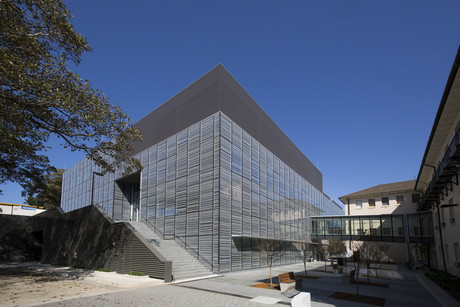Smart sensing network launched in Sydney

The NSW Smart Sensing Network (NSSN) was launched on Wednesday at the Sydney Nanoscience Hub (pictured) — also the headquarters of the Australian Institute for Nanoscale Science and Technology (AINST) — just four months after the initiative was originally announced by the NSW Government.
The $950,000 NSSN brings together smart sensing expertise in academia, industry and government to develop a collaborative and innovative network that is expected to deliver economic and social benefits for NSW. It is set to help tackle major challenges in agriculture, health, security, the environment and industry, supporting researchers working futuristic sensing technologies ranging from mobile phone-enabled air and water sensors to skin patches for monitoring sun exposure and techniques for audio recognition of koala mating calls.
For example, air sensing research led by Professor Benjamin Eggleton (below) is expected to enable air quality monitoring more cheaply and frequently, and over smaller distances, than previously possible. While current particle size and gas readings are taken at official monitoring stations which consist of large shipping containers full of complex equipment, breakthroughs such as those achieved by Professor Eggleton could lead to smartphone-sized measuring devices.

Other projects currently underway include:
- wildlife sensing capabilities led by Dr Zhe Xu, which will monitor iconic and ecologically important species including koala populations;
- water quality research led by Dr Alex Donald, which will see the development of a palm-portable device to monitor the toxic pollutants in NSW Central Coast groundwater that led to a fishing ban;
- biomedical research led by Professor Justin Gooding, which will detect clinically important biomarkers in blood and help pioneer work into UV-sensitive skin patches and sensors;
- wearables polymer fibre light guides research led by Professor Simon Fleming, which will sense changes in the body such as the movement of bedridden patients, bandage pressure and the metrics of elite athletes.
For more information about the network, visit http://www.nssn.org.au/.
Vitamin B2 production integrated into food fermentation
Researchers have successfully produced vitamin B2, also known as riboflavin, in significant...
Desalination breakthrough could bring fresh water to the world
Researchers have found a way to make sea water evaporate faster than fresh water, in a...
Nanoplastics can reduce effectiveness of antibiotics
Using complex computer models, researchers were able to prove that nanoplastic particles can bind...





